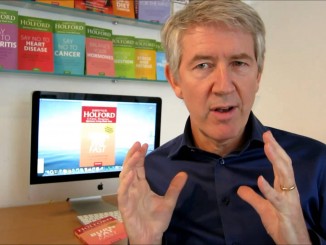 The louder a food screams ‘natural’ or ‘healthy’ at you, the further you should run. That is the somewhat counter-intuitive message of Michael Pollan’s essay, Unhappy Meals. Pollan tells us to avoid those food products that come bearing loud health claims.
The louder a food screams ‘natural’ or ‘healthy’ at you, the further you should run. That is the somewhat counter-intuitive message of Michael Pollan’s essay, Unhappy Meals. Pollan tells us to avoid those food products that come bearing loud health claims.
They’re apt to be heavily processed, and the claims are often dubious at best. Don’t forget that margarine, one of the first industrial foods to claim that it was more healthful than the traditional food it replaced, turned out to give people heart attacks. When Kellogg’s can boast about its Healthy Heart Strawberry Vanilla cereal bars, health claims have become hopelessly compromised. (The American Heart Association charges food makers for their endorsement.) Don’t take the silence of the yams as a sign that they have nothing valuable to say about health.
Indeed, as you push your trolley around the supermarket, the silent spring onions and the mute mangos are made to look positively unhealthy in the din of competing yells of naturalness and healthiness of the more processed products deeper in the store. We even have Diet Coke Plus Antioxidant now with a “hint of real green tea and antioxidant Vitamin C.”
Of course the loudest of the health screaming foods are the most processed of them all – the food supplements. Pollan argues that our obsession with health removes an important sense of joy from food. Vitamins and supplements take this to an extreme. Supplements are food stripped naked, hosed down and dressed in orange jump suits. Their salesmen, like Patrick Holford, promise huge life optimising benefits from this reductionist and sciencey attitude to food. Michael Pollan argues against this self-centred and irrational approach and implores us to reject ‘dietary nutrients’ and embrace instead good ‘dietary habits’. His manifesto is to return to communal meals, to take “serious pleasure in eating”, to eat traditional diets as found in France, Japan or the Mediteranean, and to have “small portions, no seconds or snacking”. In short, “Eat food. Not too much. Mostly plants. “
The antithesis of this approach is best found in health shops like Holland and Barrett. These shops scream their caring, green, healthy credentials at you. But when you step inside you are confronted with joyless superfood ingredients and huge rows of tubs of chemicals in pill form that imply all sorts of health enhancements. Their claims are not made in store – that might prove problematic. Health food shops rely on the ‘health food’ books and web sites that are little more than infomercials for this strange business. But people want to ‘take control of their health’ and flock to these stores on a promise of longer, better and thinner lives. And more than this, if you do have a health problem, then people like Patrick Holford are telling you that food can be better medicine than drugs. (Or rather, more likely, a food supplement can be better.) The supplement pill is a simple answer to complex problems. One of the biggest lures for a healing pill is slimming aids where a natural and healthy food supplement can lead to a slimmer you without the unnecessary inconvenience of actually thinking about your diet and your relationship with eating.
Pollan blames the corporate lobbies for this state of affairs. Rather than governments issuing simple health messages like ‘eat less meat’, the corporate lobbies have made sure this message has become ‘reduce saturated-fat intake’. The meat producers are more happy with this message as they can market their meat pies with healthy messages of ‘lower saturated fat’. And of course, the emphasis of nutrients rather than food now allows the vitamin pill entrepreneurs to complete the severance of health from food and sell you nutrients in little white tubs.
And so, a happy money-making informal collaboration now exists between food manufacturers and nutritional therapists that has created an artificial industry in ‘health food’ using the confusion of pseudoscience. This ‘confusopoly’ of businesses and their dietary health claims is not there to improve your health but to sell products that you would not otherwise buy. Sometimes this alliance is not so informal but carefully put together through marketing endorsements and product tie-ins. You need to buy the books of Patrick Holford, attend one of his seminars, subscribe to his newsletters and buy his specially formulated nutrient concoctions. Attempts by the government to reverse this trend, such as the ‘five a day’ message, are undermined by the vitamin sellers telling us that we can never get enough from mere food.
But the harm of this is not just the creation of a society confused about health and diet. We learn from the BBC today that many species of plants with potential pharmaceutical uses are endangered from over-collection and deforestation. It talks of one species,
Hoodia, which originally comes from Namibia and is attracting interest from drug firms looking into developing weight loss drugs, is on the verge of extinction.
Hoodia is a massive slimming supplement fad. Type it into google and see the adverts scream at you. What the BBC fails to really highlight is that the threat does not come from pharmaceutical companies over exploiting this resource in an attempt to find new drugs, but from your friendly, green and healthy high street health food shop. Hoodia Gordonii is a CITES protected species and yet it is on sale in shops like Holland and Barrett. I have written before about how Holland and Barrett sells shark-derived products that have no health benefits at all. The evidence base for Hoodia is equally as lean. People are buying empty promises in pill form rather than eating less.
We live in a world where truth has been inverted in the interests of corporate nutrition. The real food that we should be eating struggles to be heard over the cacophony of health claims from vested interests. We have been taught to think in terms of nutrients rather than diets and to leap on sciencey sounding easy fixes for our problems in pill form. Not only have we been divorced from the simple pleasures of eating well but our desires for faddish health fixes endangers not only ourselves and our wallets but our natural environment too.


“silence of the yams”
“silent spring onions”
Grin grin grin. (really!)
Of course there is this weird overlap where the anti-Pharma, anti-vaxer, knit-your-own-yoghurt types are stuffing these supplements down their neck while writing their bile-flecked anti-medical blogs.
The common denominator for this group is the visceral appeal of pseudoscience. The scienciness of food supplements matches the scienciness of homeopathy etc.
Scienciness must be the unholy offspring from cross-fertilising of ‘truthiness’ (http://en.wikipedia.org/wiki/Truthiness) and pseudoscience.
Yes, truthiness is such a good word.
I would like to coin ‘probitiness’, as in ‘the probitiness of the Society of Homeopaths’. I think this could well apply to most ‘regulators’ of alternative medicine.
Neither high street health food emporia nor media nutritionists seem to have much to say about the carbon footprint involved in air-freighting exotic ‘superfruits’ or indeed plant species to be consumed as supplements. Perhaps ‘greeniness’ should also go into the lexicon.